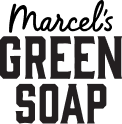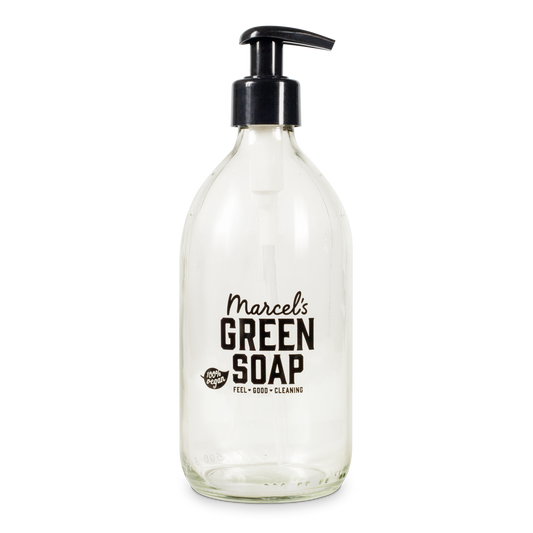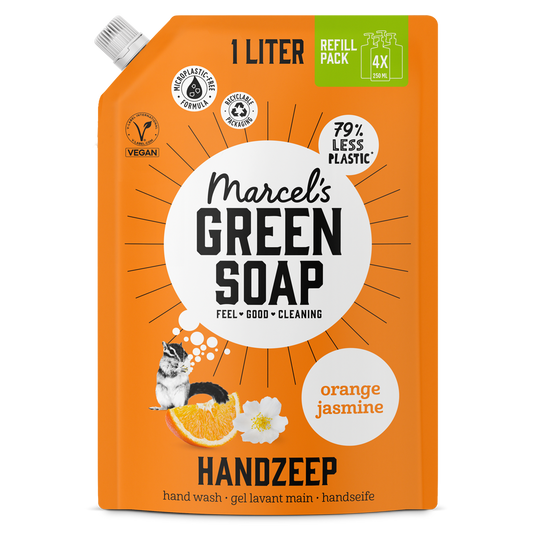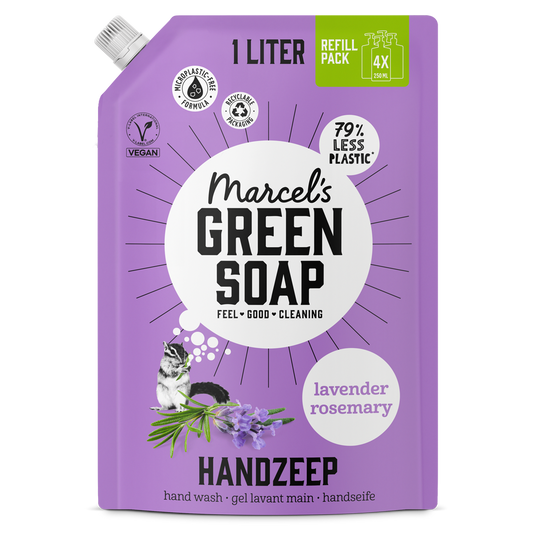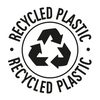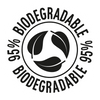In conversation with Eefje - product developer at Marcel's Green Soap. Four cleaning products in four different scents. This is how Marcel started his brand and mission five years ago. Since then, the range has expanded to 52 products, in nine different categories. We are busy developing new products every day. Eefje, product developer at Marcel's Green Soap, has a nose for delicious fragrances and product trends. She tells us all about developing new products (and fragrances) here.
How do you become a product developer at Marcel's Green Soap?
Eefje worked at various cosmetics companies and manufacturers for over twenty years before Marcel crossed her path. He asked her to work at Marcel's Green Soap as a product developer. She has now been working there for more than 3.5 years. “An honorable job,” as she calls it. Eefje has an innate curiosity about raw materials and product compositions, but is especially fond of scents. Through her work experience in various perfumery stores, she knows which scents are popular. And that knowledge comes in handy in her job at Marcel's Green Soap, because our first promise to the consumer is that our products smell wonderful.
How do you come up with the idea of a new product?
Dishwashing liquid, hand soap, all-purpose cleaner and all-purpose cleaner spray. Marcel made his debut on the cleaning shelves five years ago with these four products. He started with four somewhat unusual but delicious scent combinations: orange & jasmine, lavender & rosemary, radish & bergamot and basil & vetiver. This tasted – or rather: smelled – like more. The cleaning range was expanded to include dishwasher tablets, toilet cleaner and palm oil-free detergent. And a personal care line was launched with shampoo, shower gel and more. All this in twelve different scents. He enlisted the help of product developer Eefje to develop these products. We asked her: how do you come up with the idea of a new product?
“We are always looking for opportunities on the shelf for sustainable products. Sometimes there is a concrete demand for a particular product from the consumer, sometimes it is just a gut feeling.” At Marcel's Green Soap we focus on the light green consumer. This consumer group makes up sixty percent of our population, the majority. The light green consumer is willing to buy sustainable products, provided that no or few concessions have to be made on the quality, price and - very importantly - the experience of the product. When we develop a new product, we look at trends but above all we listen to what the consumer wants. Because the sustainable market is changing rapidly. While five years ago the light green consumer was not ready for shampoo in solid form, the shampoo bar, the demand is now greater than ever.
“We produce most of our products in the Netherlands, so I can, so to speak, go to the factory by bike.”
“We are always looking for opportunities on the shelf for sustainable products. Sometimes there is a concrete demand for a particular product from the consumer, sometimes it is just a gut feeling.” At Marcel's Green Soap we focus on the light green consumer. This consumer group makes up sixty percent of our population, the majority. The light green consumer is willing to buy sustainable products, provided that no or few concessions have to be made on the quality, price and - very importantly - the experience of the product. When we develop a new product, we look at trends but above all we listen to what the consumer wants. Because the sustainable market is changing rapidly. While five years ago the light green consumer was not ready for shampoo in solid form, the shampoo bar, the demand is now greater than ever.
“We produce most of our products in the Netherlands, so I can, so to speak, go to the factory by bike.”
Eefje: “Because we have short lines with the manufacturers, we can switch quickly. We produce most of our products in the Netherlands, so I can, so to speak, go to the factory by bike. This way we can convert an idea into a new product in a short time. This allows us to quickly respond to trends and always be a few steps ahead of other brands.”
What requirements must a Marcel's Green Soap product meet?
Marcel makes three promises to consumers: Marcel's Green Soap smells great, works well and is developed with consideration for the planet. Every new product we develop must fulfill these promises. We are therefore constantly looking for sustainable alternatives for existing recipes without consumers having to make concessions on the quality, price and experience of the product.
How do you develop a new product?
When Eefje has an idea for a new product, she gets to work with the factory. ‘I specify which ingredients I want in it and what requirements the product must meet, the factory then helps with the formulation, taking into account laws and regulations.’ Formulation is the composition of a product. And that listens rather closely. Some ingredients have a bad effect on each other, making the product fall apart or - even worse - start to smell. And that is why we mix and match until the right composition is achieved. After the product is fully developed, it is extensively tested before hitting the shelves. A safety assessor looks at the substances used, the interaction with the packaging and whether the product does not fall apart. Such a testing phase lasts three months.
“In total, we spend about nine months developing a new product, including the three-month test phase.”
“In total, we spend about nine months developing a new product, including the three-month test phase.”
Once the formulation is determined, the cost price can also be calculated. Eefje: "The price is very important to us. We want the product to be affordable for as many people as possible. It sometimes happens that we want to develop a product that ultimately turns out to be too expensive, then we don't do it."
Before a new product hits the shelves, there are a number of steps to take. First of all, the packaging. Eefje: "For our products, we have developed our own moulds. As a result, our products have a unique shape and we don't have to develop new packaging for each product. Only the label needs to be designed." 'Fun anecdote: for a few of our cleaning products, we use “old” moulds that were still on the manufacturer's shelf. So it happens that the packaging of Marcel's Green Soap detergent is shaped like an oil bottle and our dishwashing liquid is packed in an old Pokon bottle. All made of recycled plastic, of course.
In the final phase of product development, we start working on marketing, or: how do we market the product? Eefje: ‘In total, we spend about nine months developing a new product, including the three-month testing phase.’
And what about developing a new fragrance (line)?
Eefje: “Scent is emotion. People buy Marcel's Green Soap not only because it is eco-friendly, but also because it smells nice.” Eefje prefers to develop a new fragrance line every month, but this is a lot more complicated than developing a new product. “Scent has a great influence on the formulation of a product. For example, we tested all kinds of scents for our detergent before we found something that did not fall apart and stuck well to clothes.”
Developing a new scent takes a lot of time, but Eefje is always looking for surprising scent combinations. Eefje: “You have a number of fragrance families and if you cover all these fragrance families, there is something for everyone. When I came to work at Marcel's Green Soap I missed a floral scent. Together with the perfume house I then started looking for a floral scent combination. I indicate which natural scents I want in it and they then make the samples. We will then have these extensively tested.” The vanilla cherry blossom scent came out best in the test and we now have several personal care products in this spring-like floral scent.
Developing a new scent takes a lot of time, but Eefje is always looking for surprising scent combinations. Eefje: “You have a number of fragrance families and if you cover all these fragrance families, there is something for everyone. When I came to work at Marcel's Green Soap I missed a floral scent. Together with the perfume house I then started looking for a floral scent combination. I indicate which natural scents I want in it and they then make the samples. We will then have these extensively tested.” The vanilla cherry blossom scent came out best in the test and we now have several personal care products in this spring-like floral scent.
How difficult (or easy) is it to develop a green product?
Developing a product that smells good, feels nice, works well, is eco-friendly and affordable. That sounds like a challenge. Eefje: “We are constantly looking for the balance between affordability, sustainability and quality.” And that is not always easy, because although more and more sustainable alternatives are being found for environmentally harmful raw materials, they are often a lot more expensive. Moreover, 'green' raw materials sometimes have their disadvantages.
Eefje: “There is a big difference between sustainable and natural. Natural is not always sustainable and vice versa.” For example, at Marcel's Green Soap we mainly use synthetic instead of natural perfumes. Eefje: “For natural perfumes you have to extract a relatively large number of raw materials from the earth. This is not necessary for our synthetic perfumes. Moreover, with synthetic perfumes you have more control over biodegradability, allergens and quality. Natural perfumes can be contaminated, causing a product to suddenly smell different – less pleasant. We don't want that. With synthetic perfumes, the experience and quality are always the same. I would rather make a shampoo bar with synthetic components that is environmentally friendly and pleasant to use, than a natural one that does not work well or smells less good and is therefore poorly sold. Then we still miss our target.”
“There is a big difference between sustainable and natural. Natural is not always sustainable and vice versa.”
Eefje: “There is a big difference between sustainable and natural. Natural is not always sustainable and vice versa.” For example, at Marcel's Green Soap we mainly use synthetic instead of natural perfumes. Eefje: “For natural perfumes you have to extract a relatively large number of raw materials from the earth. This is not necessary for our synthetic perfumes. Moreover, with synthetic perfumes you have more control over biodegradability, allergens and quality. Natural perfumes can be contaminated, causing a product to suddenly smell different – less pleasant. We don't want that. With synthetic perfumes, the experience and quality are always the same. I would rather make a shampoo bar with synthetic components that is environmentally friendly and pleasant to use, than a natural one that does not work well or smells less good and is therefore poorly sold. Then we still miss our target.”
“There is a big difference between sustainable and natural. Natural is not always sustainable and vice versa.”
All our products are vegan, which means that we do not use animal ingredients. So we don't include beef fat, which is often used in fabric softeners. And for our solid soap products – shampoo and conditioner bars – we use cetearyl alcohol (a fatty alcohol from vegetable oils) instead of pork fat.
What products are you developing now?
In the meantime, Eefje is already busy developing new products such as Marcel's Green Soap deodorant roller, fragrance sticks and shampoo bars for different hair types. And behind the scenes she sits with her nose in all kinds of fragrance samples, looking for a new fragrance line. She already has a favorite, but whether it will be... We'll have to wait a little longer.

